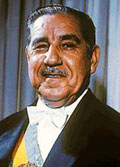Artur da Costa e Silva received military education in Brazil and the United States. In 1922 he was involved in the plot organized by young officers known as "tenentes" (lieutenants), who staged a revolt against the government of Epitácio da Silva Pessoa. Costa e Silva was arrested and later amnestied. In 1932 he joined the forces struggling against São Paulo's constitutionalist revolution. From 1950 to 1952 Costa e Silva was a military attaché in Argentina. In 1961 he was promoted to general and assumed the command of the Fourth Army in Recife, Pernambuco (1961-1962). Released from command in 1962 for harsh suppression of student manifestations, Costa e Silva was one of the leaders of the military coup of 1964 ousting President João Goulart. He served as war minister (15 Apr 1964 - 30 Jun 1966) in the cabinet of Marshal Humberto de Alencar Castelo Branco and stepped down to stand for election as president. Elected under the terms of the Constitution of 1967, Costa e Silva promptly sought to reduce constitutional rights and civil liberties. The nation was divided into national security districts headed by officials nominated by the President of the Republic. In response to oppressive measures taken by the government, a wave of student protests overwhelmed the country. When the lower chamber of National Congress refused to grant the prosecution of deputies, the military attempted to consolidate its power and introduced the Institutional Act No. 5 (13 Dec 1968) that suspended all legislative bodies indefinitely and authorized the executive to rule by decree. In 1969 Costa e Silva conceded to a moderate liberalization of the military regime, but on 28 Aug 1969 he shown first signs of cerebral thrombosis and was transferred from Brasília to Rio de Janeiro, where he was hospitalized. On 30 Aug 1969 the high command of the Brazilian armed forces at their meeting in Rio de Janeiro decided to replace the incapacitated president with a triumvirate of military ministers ignoring the rights of vice president, Pedro Aleixo. The Institutional Act No. 12 (31 Aug 1969) declared the president incapable to exercise his duties and transferred the presidency temporarily to the ministers of Navy, Army and Air Force. With no prospects for recovery of the president, the military ministers issued the Institutional Act No. 16 (14 Oct 1969), which declared the offices of president and vice president vacant. Costa e Silva died in the Laranjeiras Palace in Rio de Janeiro two months later. [1] |

